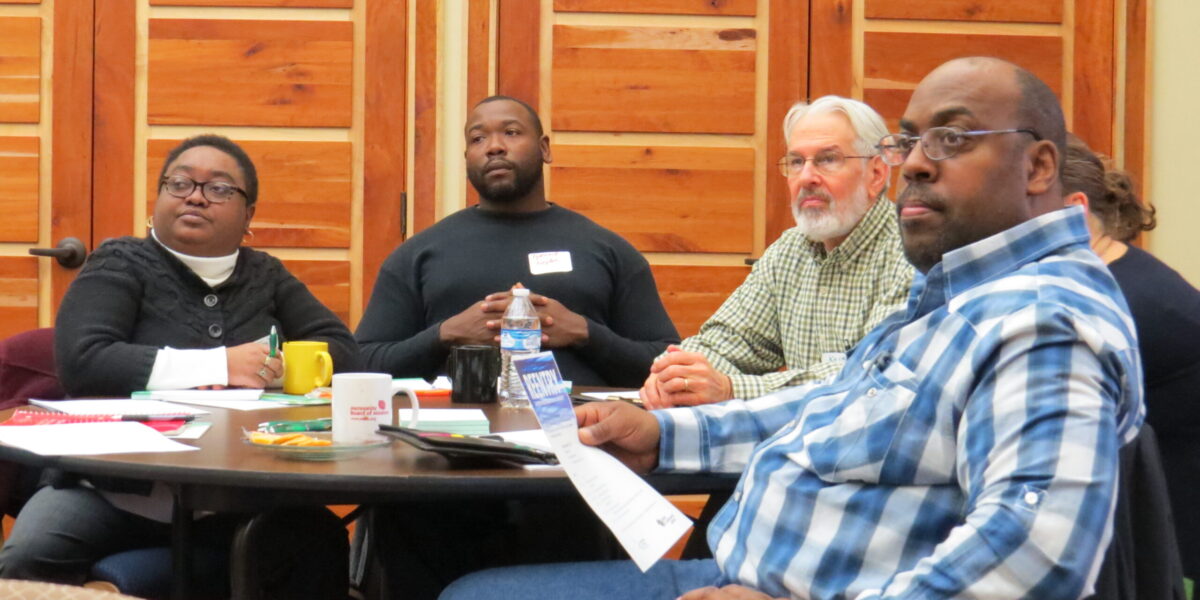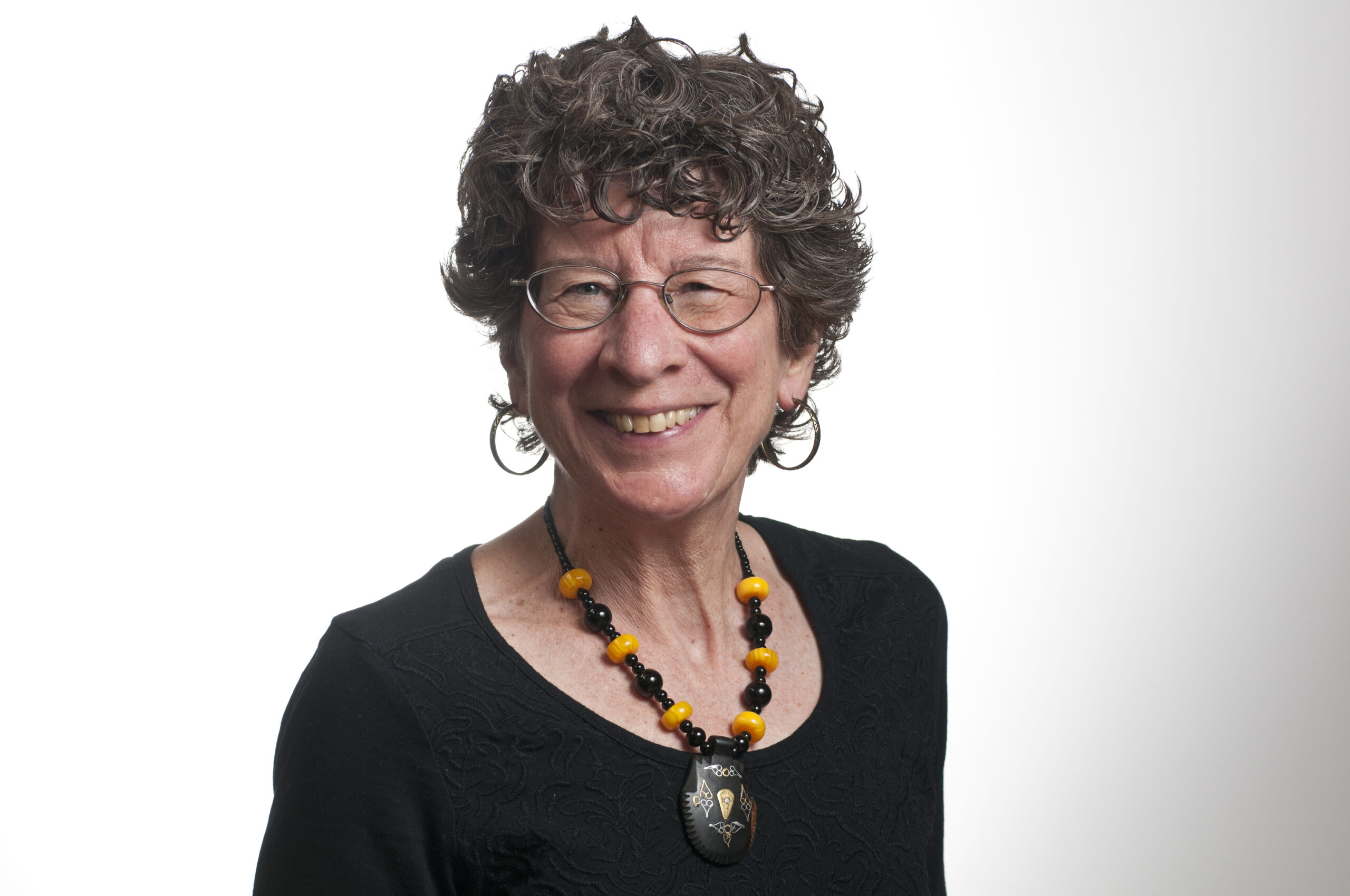ELKHART, Indiana (Mennonite Mission Network) – Yanette Freeman is an Indiana Department of Corrections officer "with a heart" said Don French, the main presenter at a Dec. 16 workshop on reentry organized by Mennonite Mission Network in collaboration with Center for Community Justice based in Elkhart, Indiana.
"With all I have done, I should be the one locked up," Freeman told the 30 participants, as she described the shortcomings of an unjust justice system. A hungry child stealing potatoes, or one wallet, comes with a whole string of consequences, she said. That can be the defining moment in a young life, if the child’s family can’t afford legal counsel, or if there is not a functional family structure.
Freeman addressed church leaders and community people involved in helping former inmates find their way back into society after having served time behind bars. More than a dozen congregations in Indiana and Michigan were represented at the eight-hour training session held at the Mennonite Church USA offices.
Familiar with the prison system from the time she was 13 years old, Freeman knew serial killers Richard Speck and John Wayne Gacy as her father’s friends. Her father had returned from Vietnam with his mind altered by Agent Orange and a heroin addiction.
"I grew up with gangs. I took all these negative things in my life and am using them for good," Freeman said, as she talked about her work as a parole officer, trying to help former inmates work within a difficult system and adapt to living in the world outside prison cells.
Restorative justice rather than retribution
Don French, coordinator of Restorative Reentry Services at Center for Community Justice, echoed Freeman’s statements about the arbitrary nature of incarceration that particularly targets communities of color. He said that some of the inmates he works with were imprisoned for things he himself had done as a young person, but for French, the consequences didn’t seriously change the trajectory of his life. Experimental use of alcohol and drugs, and fights at school – behavior that used to be seen as rites of passage – are now criminalized and contribute to the "school to prison pipeline," French said.
French compared the current system of corrections based on broken laws to restorative justice where the focus is on broken relationships. Restorative justice asks questions about who was harmed and what the obligations of the person who inflicted harm are. And then, through the participation of all parties, it works toward restitution and healing. He advocates for a coaching program that helps a person look for what is going right, rather than a supervision program that looks for what the person is doing wrong.
Part of working with people is helping them reach for goals rather than merely trying to help them keep the rules, he said. As a coach, I say, "This is about you. I want to help you reach your goal. It looks for God’s redemptive purpose in your life. What gifts has God given you?"
Much of the training focused on the fact that those who are in prison and those who are on parole aren’t very much different from many of church leaders and members in the training session.
French uses business models in his work with former inmates, such as the SWOT analysis (strengths/weaknesses/opportunities/threats) and the Pyramid of Purpose that sets goals according to an individual’s value system. Actions are put into place to reach those goals, and alternative plans B and C are elaborated in case plan A doesn’t work.
Cross-cultural challenges from congregations
Wes Bontreger, pastor at Yellow Creek Mennonite Church, asked about how congregations can bridge the culture gap between those who have never been incarcerated and former inmates.
"Identify the wounded healers in your congregation," French said. "People who have been forgiven much, can love much."
In her presentation, Nel Warketin, who coaches women in the Center for Community Justice’s transitional programs, said that most of the women she works with have been in the correctional system since they were kids.
Mission Network responds to African-American congregations
As a Mennonite Mission Network Church Relations representative, Ann Jacobs’ responsibilities include providing resources to African-American church leaders. This workshop grew out of her listening to the needs of their congregations where incarceration takes a devastating toll. Statistics show that African-American men are incarcerated in state prisons at an average rate that is five times higher than that of White men.
Jacobs organized the reentry workshop to include presentations by specialists Freeman, French and Warkentin, who work with former inmates, as well as a forum for congregations engaged in prison-related ministries to exchange experiences.
Congregations share reentry ministries
Deron Brill Bergstresser and Kay Bontrager-Singer, pastors at Faith Mennonite Church in Goshen, Indiana, talked about their congregation’s service of providing housing for formerly incarcerated and other marginalized people, who need a place to stay for six to eight weeks as they try to find their place in society.
Jacobs’ described Emerge ministries, a Church Without Walls program that reaches out into their neighborhood in Elkhart, Indiana. Cora and Jonathan Brown, pastors of this congregation, weren’t able to attend the workshop due to their community involvements.
Shawn Lange, pastor at New Foundation in Christ Fellowship in Elkhart, said that his congregation didn’t plan to start a prison ministry, but when Center for Community Justice started sending individuals to them to fulfill community work orders, they saw an opportunity.
"I praise God for how he has used our church for the past 17 years," Lange said. "When CCJ asked us to walk alongside them, we said, ‘We must seize this opportunity to share the Lord’s wisdom. We have an opportunity to change lives with Jesus’ power.’"
New Foundation members not only mentor young people doing community service, but also reach out to their mothers and grandmothers, too. They also act preventively and take their church kids to visit people who are incarcerated, and walk them through the lock-up process.
"None of the kids taken on these visits have gone to jail," Lange said.
The reentry training is the first in a series that Jacobs is planning as a response to resources requested by African-American church leaders.








